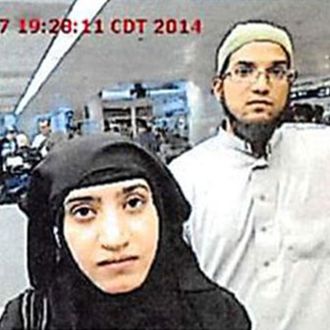
FBI director James Comey talked to reporters on Wednesday morning about the agency’s efforts to fight terrorism, and its latest information on the San Bernardino shooting case.
One piece of information altered a plot point of the attack — one that came up repeatedly during Tuesday night’s GOP primary debate. It turns out that suspects Syed Rizwan Farook and Tafsheen Malik didn’t post publicly about their commitment to ISIS or terrorism on Facebook or other social-media platforms. Instead, all communications about martyrdom and jihad took place over email or other methods of private communication. According to Reuters, Malik sent a few private messages on Facebook to friends in Pakistan in 2012 and 2014, before she came to the U.S. to marry Farook.
Comey added that it seemed like the shooters did nothing that would have made the authorities suspicious, and that there was still no evidence they had communication with extremists overseas or they were part of a larger terrorism cell. “So far, in this investigation we have found no evidence of posting on social media by either of them at that period in time and thereafter reflecting their commitment to jihad or to martyrdom,” he said, per the Washington Post. “I’ve seen some reporting on that and that’s a garble.”
Reports from shortly after the shooting indicated that Malik had announced support for ISIS on Facebook under a different name shortly before the attack, which left 14 people dead. There were also reports that Malik had publicly posted extremist views before getting a visa to come to the U.S.— after more investigating, the FBI says that didn’t happen either. This new information would render that story completely false — and would require the candidates who spoke about the topic last night to perhaps make some revisions. During the debate, Cruz said, “It’s not a lack of competence that is preventing the Obama administration from stopping these attacks. It is political correctness. We didn’t monitor the Facebook posting of the female San Bernardino terrorist because the Obama DHS thought it would be inappropriate. She made a public call to jihad, and they didn’t target it.”
Comey added he and the FBI were determined to try and deal with the difficult job of tracking extremist conversations online without messing too much with Americans’ privacy. “We are not going to break the Internet. We are not going to jeopardize people’s security.”
On Monday, State Department spokesperson John Kirby said that social media could be checked during a visa application process, but it’s not always easy. “It is also a fact, and I’m not speaking about this specific case, that many people disguise their identities on social media,” he said, according to the Los Angeles Times. “It’s also a fact that many of them have in place privacy settings that would prohibit a consular officer from being able to see much of anything in terms of content on their social media platform.”





























